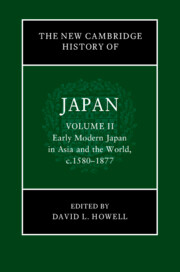Book contents
- The New Cambridge History of Japan
- The New Cambridge History of Japan
- The New Cambridge History of Japan
- Copyright page
- Contents
- Figures
- Maps
- Tables
- Contributors to Volume II
- Preface
- Frontispiece
- Introduction
- Part I The Character of the Early Modern State
- PART II Economy, Environment, and Technology
- 7 International Economy and Japan at the Dawn of the Early Modern Era
- 8 The Tokugawa Economy
- 9 The Pacific Context of Japan’s Environmental History
- 10 Scientific Communities and the Emergence of Science in Early Modern Japan
- 11 The Problem of Western Knowledge in Late Tokugawa Japan
- 12 Technology, Military Reform, and Warfare in the Tokugawa-Meiji Transition
- Part III Social Practices and Cultures of Early Modern Japan
- Index
- References
11 - The Problem of Western Knowledge in Late Tokugawa Japan
from PART II - Economy, Environment, and Technology
Published online by Cambridge University Press: 15 January 2024
- The New Cambridge History of Japan
- The New Cambridge History of Japan
- The New Cambridge History of Japan
- Copyright page
- Contents
- Figures
- Maps
- Tables
- Contributors to Volume II
- Preface
- Frontispiece
- Introduction
- Part I The Character of the Early Modern State
- PART II Economy, Environment, and Technology
- 7 International Economy and Japan at the Dawn of the Early Modern Era
- 8 The Tokugawa Economy
- 9 The Pacific Context of Japan’s Environmental History
- 10 Scientific Communities and the Emergence of Science in Early Modern Japan
- 11 The Problem of Western Knowledge in Late Tokugawa Japan
- 12 Technology, Military Reform, and Warfare in the Tokugawa-Meiji Transition
- Part III Social Practices and Cultures of Early Modern Japan
- Index
- References
Summary
The acquisition of “Western knowledge” in late Tokugawa Japan, particularly in fields of science, technology, and medicine, has functioned as a central resource not only in modernization narratives but in the legitimization of imperial geographies that situate Japan as Asia’s rightful hegemon. This chapter brings together emerging research that decenters and pluralizes existing understandings of “Western knowledge,” placing “Western knowledge” instead within broader flows of global modernity. Specifically, by examining how a “transimperial educational commons” rendered diverse new texts and resources available to late Tokugawa scholars, this chapter argues that “Western knowledge” was in fact the product of networks of mediation across South, Southeast, and East Asia. Particular sites considered include circulation and brokerage through Dutch Indonesia and Qing China. The sum of these studies indicates that the problem of late Tokugawa engagements with Western knowledge can only be solved by examining sites both beyond the West and beyond Japan.
Keywords
- Type
- Chapter
- Information
- The New Cambridge History of Japan , pp. 363 - 396Publisher: Cambridge University PressPrint publication year: 2023

